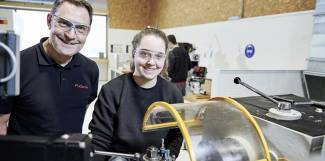Izboljšanje kompetenc mentorjev
Študije v okviru našega projekta so pokazale, da današnji dualni izobraževalni sistemi ter potrebe vajencev poklicnih šol in trg dela poudarjajo določene kompetence, ki se zahtevajo od mentorjev v podjetju, vključno s strokovnimi, tehničnimi in didaktičnimi kompetencami, poklicnimi izkušnjami na različnih področjih, socialnimi veščinami (npr. , strpnost, empatija in konfliktna sposobnost) ter motivacija za sodelovanje in izmenjavo z drugimi trenerji. Naši rezultati so pokazali tudi potrebo po nenehnem izobraževanju, da ostanemo ažurni na strokovnem področju, dualnem usposabljanju in tehničnih novostih ter da se odzovemo na vajence s posebnimi potrebami.

Advanced training
Besides founded professional skills and technical knowledge, in-company-trainers should acquire technical as well as didactic competences. Advanced courses for strengthening social skills could also be beneficial for the training of apprentices as well as the SME in general. Conducted expert interviews showed the need for certain social skills, such as openness, tolerance, and empathy and conflict ability as well as a certain degree of authority for a good trainer or mentor.
Further, professional experiences in different fields as well as continuing education are advantageous to keep an integral view on training apprentices. Regular advanced training for trainers is crucial for keeping up-to-date with new trends (e.g. digitalization) and prospering in the face of competition. In this context, it is important to receive support from the management concerning financial and time resources.
Issues of cooperation
Another frequently challenge seems to be the lack of communication and cooperation between SMEs, vocational schools and parents, which require an extensive commitment. Therefore, courses as well as support in the field of communications training are desirable. Further, some interviewed trainers find it is psychologically challenging to engage with young. Due to the increasing proportion of migrants, language barriers have also become an issue. Specific training and coaching for in-company-trainers and teachers could support them in reacting to apprentices with special needs due to their, e.g., age, language, cultural or educational background.
Key results from the SME needs assessment within DuALPlus
Another issue identified by the data gathering was the qualification profile of trainers in the Alpine Space regions. This point was integrated in the expert interviews with SME representatives conducted in Austrian, Bavaria, Trento and Slovenia.
Today’s dual educational systems as well as the needs of vocational schools, apprentices and the labour market highlight certain competences required by in-company- trainers:
- Professional, technical and didactic competences
- Professional experiences in different fields
- Social skills such as openness, tolerance, empathy and conflict ability as well as a certain degree of authority
- Continuing education to remain up-to-date concerning the professional field, dual training and technical innovations
- Courses as well as support in the field of communications training (trainees, employees, generational and cultural conflicts)
- Improved cooperation and exchange of experience, skills and knowledge among trainers

